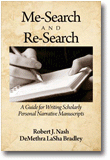
Me-Search and Re-Search
A Guide for Writing Scholarly Personal Narrative Manuscripts
By:
Robert Nash, The University of Vermont
DeMethra LaSha Bradley, Macalester College
Published 2011
From the Foreword:
Robert and DeMethra’s book, Me-Searching and Re-Search, has caught my fancy in a number of ways. The book title cleverly captures what SPN is all about—it is about self narratives (the “me-search” part) and about scholarly meaning making (the “re-search” part). This eye-catching title also illuminates the authors’ intent to turn this seemingly intimidating method of self-inquiry into something very accessible and doable. Their jargon-free language is friendly and inviting. Although they don’t intend to make their many methodological tips and tools too prescriptive, their practical suggestions provided in this guide book are, indeed, helpful and useful. I believe that Robert and DeMethra have demonstrated admirable talents as effective educators by unpacking the complex method of SPN writing into bite-sized steps. I am fully convinced that the steps will help both novices, and the experienced researcher, to reach the ultimate height of producing engaging, and scholarly significant, SPN’s. The book is also fun to read. The authors intersperse throughout their own SPN’s, pedagogical insights from their doing and teaching, and real-life stories, in order to illustrate the methodological process, challenges, and triumphs.
CONTENTS
PART I: SETTING THE STAGE FOR WRITING AN SPN. 1 What Our Book Is About. 2 Why Can’t I Write More Personally, More Honestly? 3 Autoethnographies, Memoirs, Personal Narrative Essays, Autobiographies. 4 Okay Then! What
Exactly Is Scholarly Personal Narrative Writing? PART II: THE FOUR COMPONENTS OF SPN: PRE-SEARCH, ME-SEARCH, RE-SEARCH, WE-SEARCH. 5 How Do You Get Started? 6 DeMethra’s Pre-Search Dissertation Process. 7 Speaking to All the Me-Search Self-Doubters. 8 Tell Your Story, Speak Your Truth. 9 The SPN Way to Think About Research. 10 The Relationship of Art to Truth in SPN Writing. 11 The Centrality of Theme-Search in SPN Research. 12 Moving from the Pre-, the Me-, and the Re-, to the We. 13 DeMethra’s Use of We-Search and Universalizability in Her Dissertation. PART III: THE NUTS AND BOLTS SPN TOOLBOX. 14 The Nuts and Bolts SPN Toolbox. PART IV: ADDITIONAL RESOURCES FOR SPN WRITERS. 15 Our SPN Course Syllabus.16 Putting It All Together. 17 How to Deal with PSPND Syndrome.
18 Creating an SPN Code of Ethics. 19 How to Create Faculty Support for SPN Writing. References.
-
Paperback978-1-61735-393-2
Web price: $45.04 (Reg. 52.99)
-
Hardcover978-1-61735-394-9
Web price: $80.74 (Reg. 94.99)
- eBook9781617353956

- LAN005000 - LANGUAGE ARTS & DISCIPLINES: Composition & Creative Writing
- EDU037000 - EDUCATION: Research
- REF026000 - REFERENCE: Writing Skills
-
 (Re)Envisioning Social Studies Education Research
Current Epistemological and Methodological Expansions, Deconstructions, and Creations
(Re)Envisioning Social Studies Education Research
Current Epistemological and Methodological Expansions, Deconstructions, and Creations
-
 American Educational History Journal - Golden Anniversary Edition
Volume 50 Numbers 1 & 2
American Educational History Journal - Golden Anniversary Edition
Volume 50 Numbers 1 & 2
-
 Distance Learning
Volume 20 #3
Distance Learning
Volume 20 #3
-
 Distance Learning
Volume 20 #4
Distance Learning
Volume 20 #4
-
 Faculty Development
Achieving Change Through Action Research
Faculty Development
Achieving Change Through Action Research
-
 Qualitative Research With Diverse and Underserved Communities
Qualitative Research With Diverse and Underserved Communities
-
 Quarterly Review of Distance Education
Volume 24 #1
Quarterly Review of Distance Education
Volume 24 #1

